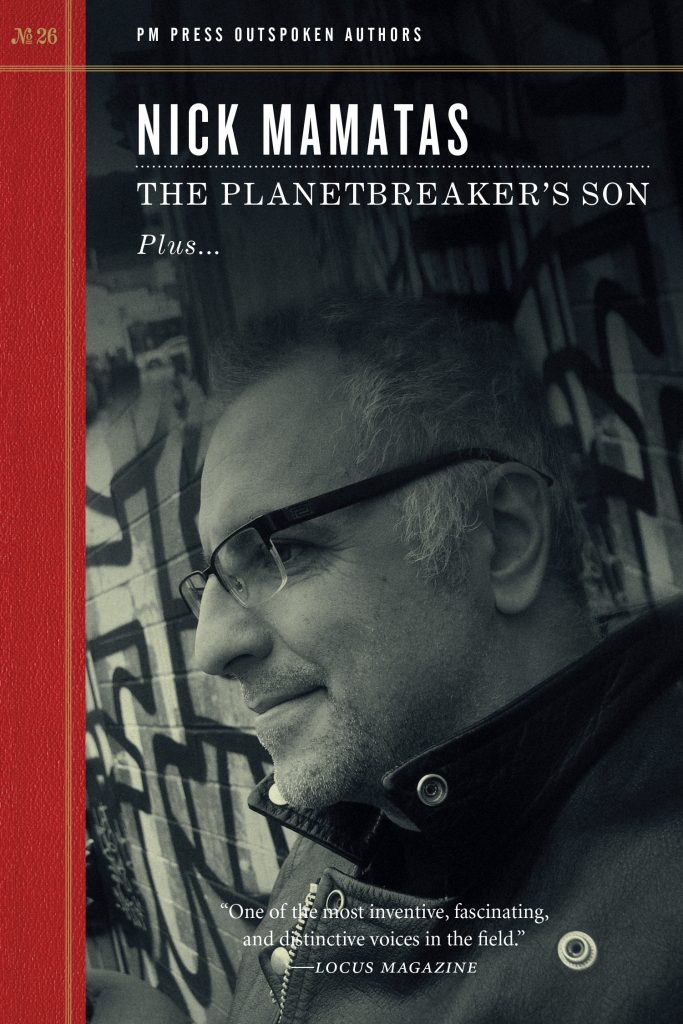By Gary K. Wolfe
Locus Magazine
June 2021
With all the venues featuring original short fiction these days, one that might be easily overlooked is PM Press’s Outspoken Authors series of chapbooks, each a potpourri of stories and essays, along with a quirky interview with series editor Terry Bisson. It has featured authors as diverse as Ursula K. Le Guin, Nalo Hopkinson, Karen Joy Fowler, Kim Stanley Robinson, and Samuel R. Delany, and often features at least one original piece – such as this year’s Nebula-nominated novelette from Meg Elison, “The Pill”. I can think of few authors more suited to the “outspoken” label than Nick Mamatas, but the original title novella that occupies most of The Planetbreaker’s Son may come as something of a surprise to Mamatas’s readers. He may remain best known for 2004’s Move Under Ground, which – years before the Lovecraft Rebuild became a Thing – featured Kerouac, Burroughs, and Cassidy facing down the Elder Gods. With “The Planetbreaker’s Son”, however, he’s leaning improbably in the direction of Greg Egan and other hard-SF poets of posthuman, post-Singularity virtuality. The setting is a starship the size of a football stadium, searching for a new planet after Earth has become uninhabitable, and the characters are all simulacra, a few of whom are old enough to remember the Earth of meatspace, but most of whom were “born” on the ship. The job of planetbreaker, it seems, involves wiping out entire superfluous planets and cultures by the simple gesture of throwing a pebble over the shoulder (this does get more or less explained later on).
Except for that bit with the pebbles, none of this sounds terribly original, but it isn’t really what “The Planetbreaker’s Son” is about. Instead, it’s about family, and in particular the challenges and paradoxes of being a parent. The Planetbreaker and his wife call themselves Zeus and Hera, while his parents Kronos and Rhea have more or less retired into the heart of a black hole. Only Hera has a job which connects to real space (or RS), remotely operating robots which maintain and repair the outer skin of the spaceship. As with all families, the parents squabble, while the son takes refuge with the grandparents. Trying to learn what it is to grow up human, he even takes to reading James Joyce’s Dubliners. Despite the bizarre setting, the story is most moving at this fundamental level; its singular image is that of the son appearing simultaneously as an eight-year-old and a surly 16-year-old, flickering between these stages while the mother tries to figure out how one child has evolved from the other, and what to do about each.
The Planetbreaker’s Son is rounded out by a mordantly entertaining essay about Mamatas’s brief career as a term paper ghostwriter, a cheerfully violent story called “Ring, Ring, Ring, Ring, Ring, Ring, Ring”, set in Jeffrey Thomas’s far-future urban inferno of Punktown, the aforementioned interview with Bisson, and a helpful bibliography. I’m not sure that all this constitutes a very useful introduction to readers unfamiliar with Mamatas’s prior work, which has often tended more toward fantasy, horror, and crime fiction, but then these PM Press titles have always been less literary samplers than literary loot crates, and they’re always fun.
Gary K. Wolfe is Emeritus Professor of Humanities at Roosevelt University and a reviewer for Locus magazine since 1991. His reviews have been collected in Soundings (BSFA Award 2006; Hugo nominee), Bearings (Hugo nominee 2011), and Sightings (2011), and his Evaporating Genres: Essays on Fantastic Literature (Wesleyan) received the Locus Award in 2012. Earlier books include The Known and the Unknown: The Iconography of Science Fiction (Eaton Award, 1981), Harlan Ellison: The Edge of Forever (with Ellen Weil, 2002), and David Lindsay (1982). For the Library of America, he edited American Science Fiction: Nine Classic Novels of the 1950s in 2012, with a similar set for the 1960s forthcoming. He has received the Pilgrim Award from the Science Fiction Research Association, the Distinguished Scholarship Award from the International Association for the Fantastic in the Arts, and a Special World Fantasy Award for criticism. His 24-lecture series How Great Science Fiction Works appeared from The Great Courses in 2016. He has received six Hugo nominations, two for his reviews collections and four for The Coode Street Podcast, which he has co-hosted with Jonathan Strahan for more than 300 episodes. He lives in Chicago.







